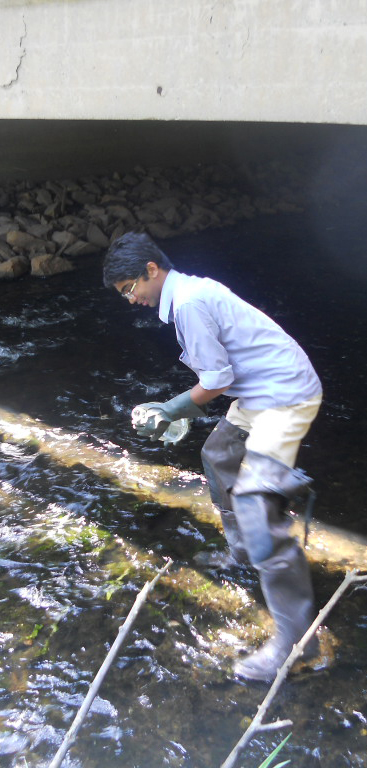Summary 
Endocrine disrupting compounds (EDCs) and pharmaceuticals and personal care products (PPCPs) encompass hundreds of trace contaminants that have been detected in raw and treated drinking waters. Water utilities have expressed concern over these compounds and many have initiated expensive monitoring programs. Unfortunately, the choice of compounds to monitor has frequently been made in a haphazard way and without careful consideration of local conditions. In addition, the selection of monitoring sites and frequency has often been done without regard to the way in which monitoring data would be used, or the unique features of these compounds, including source types, loading dynamics, and behavior in the environment.
Therefore, the goal of this proposal is to develop a watershed-level protocol for addressing EDC/PPCP monitoring needs, utilizing a combination of statistical tools, GIS and spatial analysis, and analytical sampling of indicator and surrogate compounds. During the initial tasks, the Project Team will develop a general protocol for designing a sampling campaign using 1) Geographic Information Systems (GIS) and spatial analysis tools with available land use and other GIS layers to identify potential EDC and PPCP sources in a watershed, and to find optimal sampling locations; and 2) statistical analysis of existing data, in conjunction with GIS-based information on potential sources in the watershed, to determine a rational set of representative indicator compounds (a few EDC/PPCP compounds as indicative of the others) and surrogate parameters (conventional water quality parameters highly correlated with EDC/PPCP compounds), and to find optimal sampling frequency. These two tasks will use publicly available historical data from at least five watersheds (Lake Mead/Colorado River; Croton and Cat/Del systems, NY; South Platte River, CO; Cape Fear River Basin, NC; and the Assabet River, MA) and perform an a posteriori analysis of the data sets. Once the generalized protocol is developed, it will be applied to two distinctly different watersheds (the South Platte, CO and Assebet River Basins, MA) and their associated water utilities as a proof of concept. The protocols developed and validated during this study will assist drinking water utilities, individually or as a consortium, in utilizing limited resources intelligently to address the issue of EDCs and PPCPs in a cost effective manner, setting up a network of sampling locations throughout a watershed along with timing criteria for sample collection to achieve maximum benefit of the sampling performed. The principal product of this research will be a detailed, comprehensive, and well-tested list of protocols and strategies that can be used by a utility wishing to implement their own EDC/PPCP monitoring program.
Project Resources
UMass Documents
- Full Project Narrative
- Progress Reports
- First Report
- Second Report
- Third Report
- Fourth Report
- Fifth Report
- Sixth Report (PAC meeting)
Other References and Background Documents
| EDCs/PPCPS | Study Watersheds | Models & Methods |
|---|---|---|
Production & Usage |
Assabet River, MA |
|
Lake Mead |
Source-based Models |
|
South Platte River, CO |
Aquatic Models |
|
Cape Fear, NC |
Endocrine Disruption |
|
| Removal by Natural Processes | ||
| Watershed/River Case Studies |
Project Partners
Hazen & Sawyer
AECOM
NY DEP
4 Cities in CO (Aurora, Boulder, Denver & Thornton)
MA DEP and USGS
Project Team
Graduate Students & Post Docs
Minji Park (Post Doctoral Researcher)
Varun Srinivasan (research assistant - MS student)
Research Staff
Larry Kramer (Research Associate)
Sherrie Webb-Yagodzinski (EWRE Lab Manager)
Kathy Whynott (EWRE Grants Manager)
Investigators
Mi-Hyun Park (PI, UMass, CEE)
Dave Reckhow (PI, UMass, CEE)
Michael Lavine (Special Consultant, UMass)
Ben Stanford (PI, Hazen & Sawyer)
Eric Rosenfeldt (PI, Hazen & Sawyer)
Alex Mofidi (PI, AECOM)
David Lipsky (PI, NY DEP)